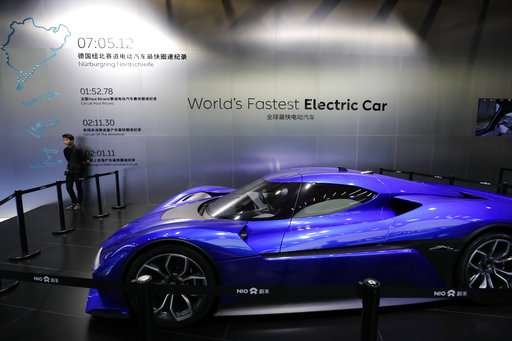In this Thursday, April 20, 2017 photo, the $1.5million NIO EP9 is displayed at the Shanghai auto show. NIO is part of a wave of fledgling automakers - all backed at least in part by Chinese investors - that are propelling the electric vehicle industry's latest trend: ultra-high-performance cars. (AP Photo/Ng Han Guan)
Want an insanely fast ride with zero emissions? Startup NIO has the car: An electric two-seater with muscular European lines and a top speed of 195 miles per hour (313 kilometers per hour).
The catch: The EP9 costs nearly $1.5 million. NIO, a Chinese-Western hybrid with bases in Shanghai, London and Silicon Valley, created it to showcase the company's technology and had no sales plans. But it is taking orders for "bespoke vehicles" after hearing from buyers ready to pay the eye-popping price.
"We are actually pleasantly surprised how much interest we are getting," said the CEO of NIO's U.S. unit, Padmasree Warrior, a veteran of Cisco and Motorola.
Phys.org: China propels rise of electric ultra-high-performance cars
There's some idea the rich can handle these cars without the years of track experience needed to develop skill with high speed driving and the idea of the capability of the rich in this regard is belied by the number of times those fools demolish these vehicles in high-speed crashes.
A prototype of a Dutch flying car at the headquarters of the PAL-V firm, which is aiming to deliver its first car in 2018.
While several futuristic projects are under way in different countries, a Dutch design may be the first one sold and soaring into the skies.
After years of testing, the PAL-V company aims to pip its competitors to the post. It is poised to start production on what they bill as a world first: a three-wheeled gyrocopter-type vehicle which can carry two people and will be certified for use on the roads and in the skies.
"This kind of dream has been around for 100 years now. When the first airplane was invented people already thought 'How can I make that driveable on the road?'," chief marketing officer Markus Hess told AFP.
The PAL-V (Personal Air and Land Vehicle) firm, based in Raamsdonksveer in the Netherlands, is aiming to deliver its first flying car to its first customer by the end of 2018.
Phys.org: Dutch firm aims to deliver first flying car in 2018
There you have the perfectly imperfect hybrid since it's probably not much as an aircraft and it completely sucks as a car. A license as a driver and another as a pilot are required for the vehicle so, thankfully, that will limit them since there are few things we need less than drunkies with guns flying about above us.
- Insert long-winded editorial on conspicuous consumption being further evidence of the breakdown of any social sensibilities because you know it already from the suggestion -
Sorry, mates, but this stuff is overpriced gimcrackery which doesn't show innovation so much as decay. There is no envy in the Rockhouse since a racing automobile has to have a sense of nasty and an EV is never going to give up any nasty. In that regard, fast or no, they're like Barbie Dolls. The PAL-V does have two motors so it's possibly not as much of a death trap it appears although there is no mention of a transponder so other aircraft won't be aware of its location. In other words, it's bait.
These vehicles don't solve traffic problems but rather make more of them.



No comments:
Post a Comment